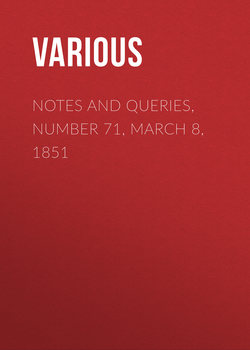Читать книгу Notes and Queries, Number 71, March 8, 1851 - Various - Страница 3
Notes
FOLK LORE
ОглавлениеSacramental Wine.—In a remote hamlet of Surrey I recently heard the following superstition. In a very sickly family, of which the children were troubled with bad fits, and the poor mother herself is almost half-witted, an infant newly born seemed to be in a very weakly and unnatural state. One of the gossips from the neighbouring cottages coming in, with a mysterious look said, "Sure, the babby wanted something,—a drop of the sacrament wine would do it good." On surprise being expressed at such a notion, she added "Oh! they often gives it." I do not find any allusion in Brand's Antiquities to such popular credence. He mentions the superstition in Berkshire, that a ring made from a piece of silver collected at the communion (especially that on Easter Sunday) is a cure for convulsions and fits.
Albert Way.
"Snail, Snail, come out of your Hole" (Vol. iii., p. 132.).—Your correspondent S. W. Singer has brought to my recollection a verse, which I heard some children singing near Exeter, in July last, and noted down, but afterwards forgot to send to you:—
"Snail, snail, shut out your horns;
Father and mother are dead:
Brother and sister are in the back yard,
Begging for barley bread."
Geo. E. Frere.
Perhaps it would not be uninteresting to add to the records of the "Snail-charm" (Vol. iii, p. 132.), that in the south of Ireland, also, the same charm, with a more fanciful and less threatening burden, was used amongst us children to win from its reserve the startled and offended snail. We entreated thus:—
"Shell a muddy, shell a muddy,
Put out your horns,
For the king's daughter is
Comings to town
With a red petticoat and a green gown!"
I fear it is impossible to give a clue as to the meaning of the form of invocation, or who was the royal visitor, so nationally clothed, for whose sake the snail was expected to be so gracious.
F. J. H.
Nievie-nick-nack.—A fire-side game, well known in Scotland; described by Jamieson, Chambers, and (last, though not least) John McTaggart. The following version differs from that given by them:—
"Nievie, nievie, nick, neck,
Whilk han will thou tak?
Tak the richt, or tak the wrang,
I'll beguile thee if I can."
It is alluded to by Sir W. Scott, St. Ronan's, iii. 102.; Blackwood's Magazine, August, 1821, p. 37.
Rabelais mentions à la nicnoque as one of the games played by Guargantua. This is rendered by Urquhart Nivinivinack: Transl., p. 94. Jamieson (Supp. to Scot. Dict., sub voce) adds:
"The first part of the word seems to be from Neive, the fist being employed in the game. Shall we view nick as allied to the E. v. signifying 'to touch luckily'?"
Now, there is no such seeming derivation in the first part of the word. The Neive, though employed in the game, is not the object addressed. It is held out to him who is to guess—the conjuror—and it is he who is addressed, and under a conjuring name. In short (to hazard a wide conjecture, it may be), he is invoked in the person of Nic Neville (Neivie Nic), a sorcerer in the days of James VI., who was burnt at St. Andrew's in 1569. If I am right, a curious testimony is furnished to his quondam popularity among the common people:
"From that he past to Sanctandrois, where a notable sorceres callit Nic Neville was condamnit to the death and brynt," &c. &c.—The Historie and Life of King Jame the Sext, p. 40. Edin. 1825. Bannatyne Club Ed.
J. D. N. N.
